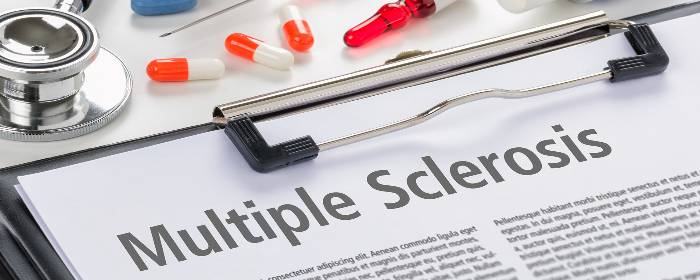
by admin | Jul 2, 2019 | Health Awareness, Multiple Sclerosis
Multiple sclerosis (MS) is a chronic inflammatory condition of the central nervous system. The disorder produces a broad range of symptoms, including fatigue and poor muscle coordination, which can make exercise daunting. Yet, research shows that in addition to prescription-based approaches, complementary therapies such as exercise may help to alleviate symptoms and minimize the risk of secondary conditions. Discover more about the relationship between exercise and MS below.
How Does Exercise Help MS?
Exercise has been shown to improve a number of MS symptoms. In addition to promoting better overall health, embarking on an aerobic fitness routine has helped people with MS improve strength and cardiovascular fitness, maintain better bladder and bowel function, and reduce fatigue and depression. Additionally, exercise program participants have reported a more positive attitude and increased social activity.
What’s the Best Type of Exercise for MS?
While light to moderate activity can help to control MS symptoms, any activity that’s too strenuous can have the opposite effect, exacerbating issues like fatigue and increased risk for injury. It’s, therefore, a good idea to work with a professional, such as a physical therapist, before beginning any new exercise routine.
Light activities like gardening, low-impact aerobic exercises, stretching, and progressive strength training are well-suited for many people with MS. Additionally, water-based exercises are especially ideal. Water provides buoyancy, enabling participants to move in ways they may not be able to on land while eliminating the risk of fall injuries. Plus, accessories like flotation vests and pool noodles can be implemented to maintain safety. Finally, the water keeps participants cool, thereby reducing the risk of overheating which can cause MS symptoms to flare.
If you’re interested in pursuing a fitness program to help manage your MS symptoms, be sure to work with your care providers to find an approach that will best suit you.

by admin | Apr 20, 2019 | Cannabinoid, CBD, Multiple Sclerosis, Stem Cell Therapy
Four out of five people with multiple sclerosis experience muscle spasticity. Muscle spasticity causes increased muscle tone, uncontrollable muscle contractions, and spasms. Like severe muscle cramps, muscle spasticity can be quite painful and is one of the most troubling symptoms of multiple sclerosis. Despite being so common and so troublesome, multiple sclerosis patients with muscle spasticity have few effective treatments options. In many cases, the muscle spasticity continues even after treatment with drugs such as baclofen or tizanidine. Not only are these drugs largely ineffective, in many cases they cause substantial side effects.
Marijuana has long been known to exert a muscle relaxing (anti-spasmodic) effect. As medical marijuana is becoming legal in more jurisdictions, researchers are now carefully studying the effects of the substances within marijuana. One important example is a study conducted by Spanish researchers. In 2010, Spanish drug authorities approved the use of an oral spray that contains a combination of delta-9-tetrahydrocannabinol (THC) and cannabidiol (CBD), two active substances found in marijuana (Cannabis sativa). Spanish authorities approved the use of this drug for multiple sclerosis patients with moderate to severe muscle spasticity who did not benefit from other antispasmodic drugs.
Dr. Lorente Fernández and other Spanish researchers were interested in learning whether this combination of THC and CBD was able to help multiple sclerosis patients with severe muscle spasticity. The scientists found that the combination of substances found in medical marijuana was effective in 80% of patients they examined. What is striking about this finding is that every patient included in this study had failed to find relief from other medical treatments of spasticity. In other words, they had difficulty in treating muscle spasticity. When viewed in those terms, an 80% effectiveness rate is extremely impressive.
Some patients withdrew from treatment because they felt that THC/CBD did not help them within the first 30 days of starting treatment or some experienced dizziness or weakness.
Muscle spasticity is one of the most common, most troubling, and most difficult to treat symptoms of multiple sclerosis. While traditional medical treatments often fail, the substances in medical marijuana may offer hope. This study illustrates that 4 out of 5 multiple sclerosis patients with difficult to treat muscle spasticity achieved relief from a combination of THC and CBD, substances found in medical marijuana.
Visit our website for available hemp extract products. Click here
Reference: Lorente Fernández et al. (2014). Clinical experiences with cannabinoids in spasticity management in multiple sclerosis. Neurologia. 2014 Jun;29(5):257-60.

by admin | Mar 8, 2019 | Mesenchymal Stem Cells, Multiple Sclerosis, Stem Cell Research, Stem Cell Therapy
Of all conditions that affect the central nervous system, Multiple Sclerosis (MS) is the most common in young adults. The severity of multiple sclerosis varies considerably and can affect almost every organ system in the body affecting eyesight, bowel function, bladder function, and sexual function. Multiple sclerosis may cause cognitive problems, depression, seizures, fatigue, and pain. Most people with multiple sclerosis will have a relapsing-remitting course, which means they will have periods of relative health punctuated by flare-ups of the condition. About one out of ten people with the condition will have primary progressive multiple sclerosis, which means once the disease occurs it almost constantly causes symptoms and progresses over time.
Multiple sclerosis appears to be an inflammatory condition that affects the covering around nerves. During acute flareups/exacerbations, physicians usually prescribe a powerful steroid medication such as methylprednisolone to combat the inflammation. Patients with multiple sclerosis generally always require some sort of treatment to help manage their immune system. No fewer than 15 immune modulating treatments have been used to treat multiple sclerosis, none of which provides a cure. As such, researchers are seeking new and innovative ways to treat this potentially debilitating condition.
Researchers at the Tisch Multiple Sclerosis Research Center of New York chose to focus their research efforts on a particular type of stem cell, namely bone marrow-derived mesenchymal stromal cells. The researchers harvested these cells from the patients themselves (autologous stem cells). Then, in their laboratory, scientists used various means to prompt the cells to become neural progenitors. A neural progenitor cell is a cell that can become any of the three main types of brain cells: neurons, astrocytes, or oligodendrocytes. Incidentally, oligodendrocytes are believed to be most affected in multiple sclerosis.
Harris and co-authors at the Tisch Center enrolled six patients with progressive multiple sclerosis. These six patients had failed to find relief from other conventional multiple sclerosis treatments. The researchers provided between 2 to 5 infusions of neural progenitor cells into the spinal fluid. The multiple sclerosis patients treated with the cells tolerated the treatment very well. No serious adverse events occurred, nor were there any safety concerns during treatment. Impressively, four of the six patients—for whom no other multiple sclerosis treatment worked—had a measurable clinical improvement after stem cell treatment.
Based on the results of this clinical study, the scientists concluded that neural progenitor cells created from autologous mesenchymal stromal cells were safe to use in patients with primary progressive multiple sclerosis. Moreover, the beneficial effect witnessed in two-thirds of treated patients suggests that these cells may be able to help patients with even the most severe and difficult-to-treat forms of multiple sclerosis. Of course, additional testing is required before this treatment becomes commonplace, but the results of this first-in-human clinical study are extremely encouraging.
Reference: Harris et al. (2016). Clinical safety of intrathecal administration of mesenchymal stromal cell-derived neural progenitors in multiple sclerosis. Cytotherapy. 2016 Dec;18(12):1476-1482.

by admin | Dec 19, 2018 | Health Awareness, Multiple Sclerosis
Multiple sclerosis (MS) is a chronic condition in which the body’s immune system directs itself against the central nervous system (CNS). Most often, this impacts the brain, spinal cord, and optic nerves. The symptoms of this condition can vary widely, with some people experience mild effects and others struggling to complete daily tasks.
Frustratingly, many of the symptoms of MS aren’t outwardly visible. These behind-the-scenes challenges are therefore often endured silently, while the patient’s friends and family members may assume that their appearance of health indicates minimal to no suffering. Here are some of the symptoms which, despite their invisibility, can be debilitating; along with practical coping mechanisms to help you maintain your quality of life.
Pain
Up to two-thirds of people with MS report pain. For many, it interferes with aspects of daily life, including career, recreation, mood, and their ability to complete activities. The steady discomfort is suspected to result from fatigued muscles, which are working to compensate for those weakened by the disease. Sometimes, chronic pain is reported to feel like a tight band around the chest or torso, known as the “MS hug.” It may also feel like burning, prickling, aching, or “pins and needles.”
Sharp pains, on the other hand, are believed to be from faulty nerve signals caused by the lesions produced by MS in the CNS. The damage to the nerves is called dysesthesia and can impact the legs, feet, arms, and trunk. Up to 55% of people with MS have experienced this “clinically significant pain,” and while it isn’t necessarily dangerous, it can be a source of significant frustration.
For some people, compression stockings or gloves can minimize the pain caused by dysesthesias. For others, pain is more pronounced and requires the use of medications. Doctors may prescribe anticonvulsant medications or antidepressants, which change the ways in which the CNS reacts to pain. Over-the-counter pain relievers, including acetaminophen, and warm compresses can also be used to combat pain under a doctor’s supervision.
In many cases, chronic pain is best addressed through anti-inflammatory drugs, either over-the-counter or prescription. Stretching routines may also aid in maintaining flexibility in the muscles, which could help with pain levels. Massage therapy and physical therapy may also be beneficial. Some seeking an alternative option will consider stem cell therapy due to the potential regenerative ability these stem cells offer for those with MS.
Ultimately, discomfort for MS patients varies in intensity. On days when pain is most severe, changing your routine may provide the greatest relief. Whether it’s declining a social event or using a mobility-assistive device, it’s important to find ways to put your comfort first when experiencing intense pain.
Fatigue
The fatigue MS patients experience goes beyond general tiredness: it is often described as a flu-like feeling of exhaustion or extreme muscle weakness. It occurs in 80% of people with the condition and is therefore among its most common symptoms. Although the condition itself can be the cause, it’s also possibly related conditions, such as sleep disorders, medications, and depression could be culprits behind fatigue.
To determine the best form of treatment for your fatigue, consult with your doctor to pinpoint the reason for your exhaustion. If it’s the condition itself, lifestyle management tactics developed through occupational and physical therapy could make day-to-day tasks more manageable. Scheduling rests and even short naps could help you conserve energy. Also, while it might seem counterintuitive, light physical activity might actually combat energy depletion.
For sleep-related issues, stress management, relaxation training, and sleep regulation techniques may be beneficial. If your fatigue comes on suddenly, occurs regularly, and begins to interfere with responsibilities, consider talking to your doctor about medication options.
Cognitive Issues
Cognitive impairment, including issues with memory, perception, learning, and problem-solving, is reported by nearly 50% of people with MS. Sometimes, it can be difficult to tell whether the symptom is tied to the mental fatigue or “brain fog” the condition causes, or whether the mental glitches are actually a result of the impact MS has on the CNS.
While research on the best methods for treating cognitive impairment in MS is still ongoing, there are some tactics you can implement to work around any mental challenges you may experience. Mood management is a good starting point: if you experience inexplicable mental or emotional shifts, you could be suffering from depression. This symptom may be a result of the condition itself, or it could be attributed to medications, in which case you could discuss with your treating physician to see if adjustments to your treatment may be needed.
For some people, brain exercises such as puzzles and memory games help to maintain mental acuity. The brain is a muscle, and working it out regularly is important to facilitating strength. Planning your days in advance is also a good way to minimize any challenges cognitive issues may pose. Schedule important tasks for the times of day when you feel most alert. Finally, don’t hesitate to seek out support from counselors, support groups, or loved ones. Isolation can exacerbate cognitive decline, but socialization can improve or minimize the symptom.

by admin | Nov 21, 2018 | Stem Cell Therapy
Multiple sclerosis (MS) has widespread effects on the body. The disease is characterized by a breakdown of the protective cover surrounding the nerves, called the myelin sheath. When the myelin sheath is compromised, it makes it more difficult for the brain to communicate critical messages to the rest of the body. Unfortunately, the ways in which MS affects the body are rarely isolated: when nerve cells are damaged as a result of myelin sheath damage, it leads to a disconnection between the brain and the organs, muscles, and tissues.
Muscle Weakness & Pain
Muscle weakness can impede daily life, and for some, it turns even basic tasks into obstacles. Weakness is often reported by MS patients in the limbs, which can make it difficult to walk, shower, and get dressed. It’s also the culprit behind foot drop, in which the front part of the foot cannot be lifted. This causes individuals to adjust their gait, such as swing their leg outward.
Beyond weakness, MS also often produces muscular pain. Many people with MS experience a sensation of “pins and needles,” sharp pain, tingling, or aches. Involuntary muscle spasms are also common and are experienced primarily in the legs.
Treatment Options
While options such as nerve-blocking agents, muscle relaxants, and pain relievers may be prescribed to treat severe muscle spasms or pain, many patients choose to explore non-drug alternatives first. Working with an occupational therapist, for example, can aid people with muscle pain or weakness in developing different approaches for completing daily tasks and conserving energy. Physical therapists, too, can provide targeted exercises to strengthen key muscle groups, which could help to combat muscle weakness or pain. Lastly, lifestyle adjustments such as improved sleep habits, rest breaks, and assistive devices could help you navigate the muscular challenges presented by MS. Stem cell therapy may also be an alternative option those with MS may consider to potentially help in managing some of the symptoms associated with MS.






 St. Petersburg, Florida
St. Petersburg, Florida
